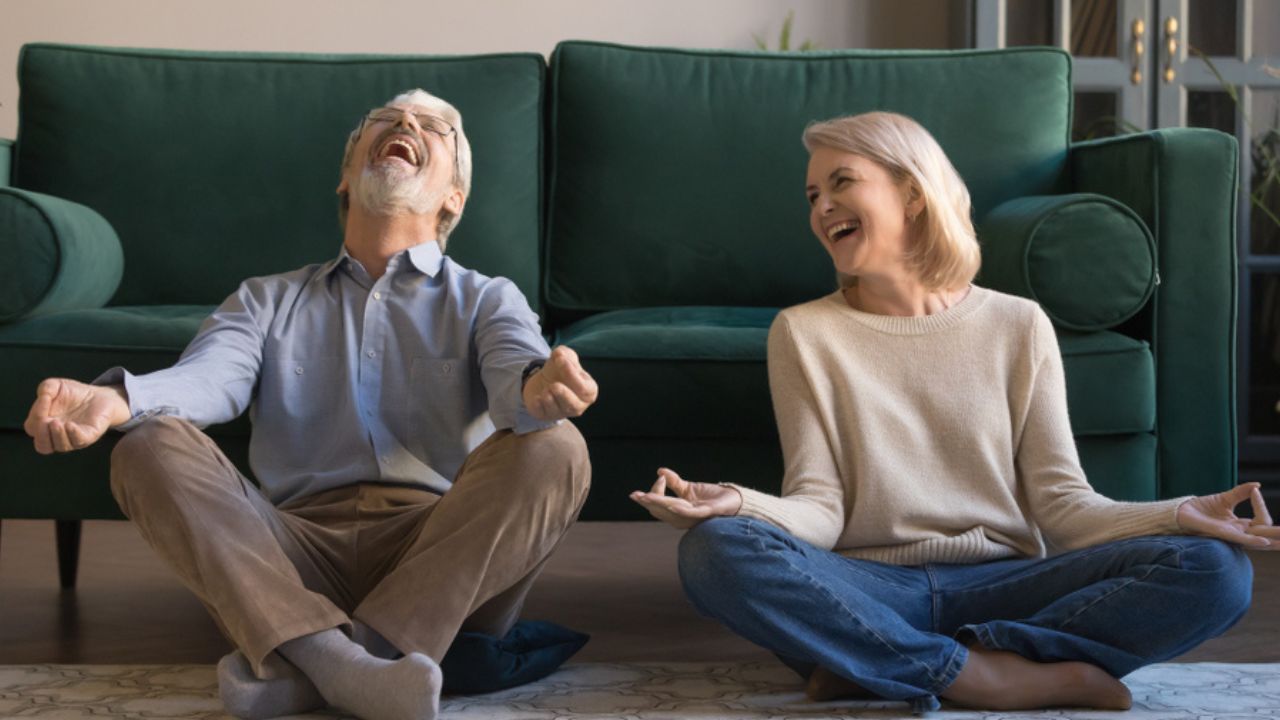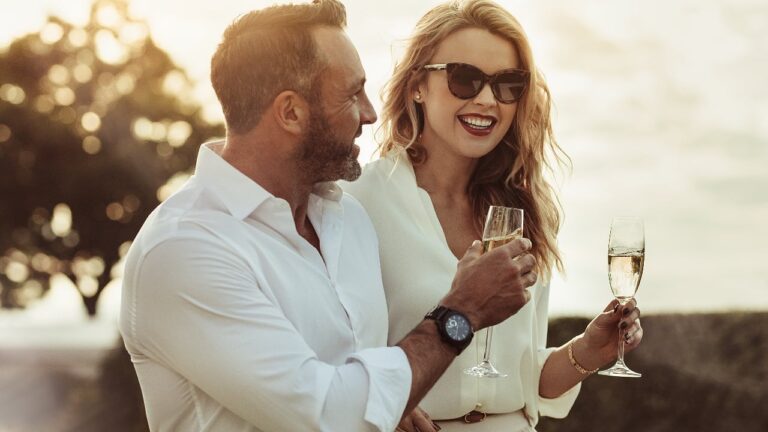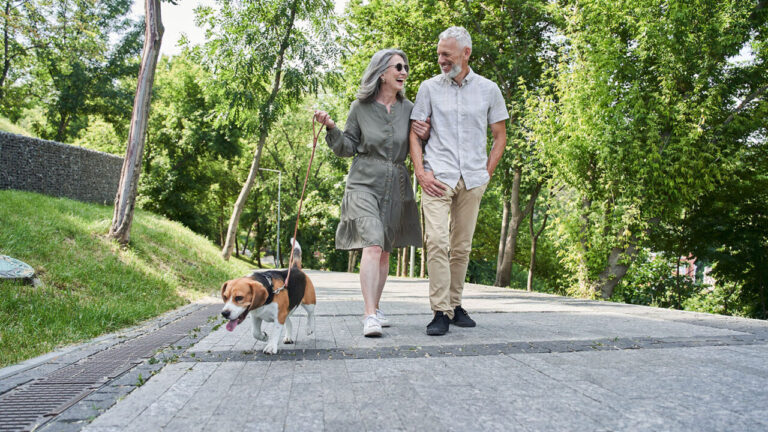23 Subtle Signs You’re Aging Gracefully

Aging is inevitable, and some handle the process like an art form.
From Helen Mirren’s elegance to Martha Stewart’s timeless charm, aging gracefully isn’t just about good genes; it’s an art form mastered over time. They show that getting older doesn’t mean giving up. In fact, there are many habits research recognizes as signs that, like a fine wine, you’re getting better with age.
Our selection criteria focus on indicators of aging with poise and health, steering clear of cosmetic enhancements that hide aging. We highlight habits and traits that embody grace and longevity that are actually achievable for everyone.
Socializing

A sure sign of aging well is a healthy friend circle.
There have been exhaustive studies on the correlation between loneliness, mental health, and physical well-being. According to the National Institue of Aging (NIA), older people suffering from isolation are at higher risk of many conditions, including heart disease, high blood pressure, and Alzheimer’s disease.
Keeping a Sharp Mind

Older people who struggle to remember where they are, why they are there, or how they got there betray their age. Others can appear more youthful, as if they’re still operating with the same brain they had when they were 20. Thankfully, there are keys to unlocking evergreen mental dexterity.
Harvard Health argues that maintaining strong social networks, keeping physically active, and consuming a Mediterranean-style diet are three steps all retirees should take, among others.
Having Purpose

If you’ve reached your golden years and still have a million things on your to do list to get through, chances are you’re aging better than you think.
A 6,985 cohort of 50-plus adults participating in a Journal of the American Medical Association (JAMA) study found that purpose is crucial to aging well. The study’s results indicated that women were more likely to have a purpose later in life, though life purpose across all demographics produced extended mortality.
Being at Peace

Let’s be honest: being angry in old age shows a lack of grace. Something is unsettling about an aging individual being angry at the world; it can indicate unsettled past trauma or regret. A sure sign of accepting time’s influence is being at peace.
An American Psychological Association (APA) report found that anger in old age may exacerbate health problems, such as inflammation.
Learning New Skills

The National Institute of Health (NIH) says learning new skills in later life shows a clear connection to better cognitive health. One study about older participants who learned digital photography or quiltmaking had stronger memory improvement than others in their age group who participated in less mentally rigorous tasks or merely socialized.
Those for whom retirement means “retirement” may want to reconsider their twilight.
Being Patient

Do we become more patient as we age? Logic would say this isn’t true, considering the reduced time we have when we age. However, we don’t need a study to show us that a determiner of youth is impatience. Nevertheless, Science Direct says studies show there is a correlation between economic hardship and reduced patience in older generations.
This notion can’t be a surprise, as older people are more likely to have assets, investments, and a 401K to add peace of mind.
Keeping Up Appearances

It can’t be easy for someone who has relied on appearance all their life to fight the inevitable ravages of time. However, who says we can’t still look our best when we get older? Seeing gravity take its toll is one thing; giving up is another.
Those older people who still pay attention to their appearance are still fighting the good fight. Plus, there is something to be said about taking time to focus on you, even if you’re scrolling as you sit in a salon chair. Even the repetition of a bi-weekly haircut can give aging men something to look forward to.
Staying Open Minded

It can be hard to desert your ways as you age, which is no crime. Though there’s nothing worse than a stick in the mud. The health benefits of keeping an open mind are hard to ignore. Jean Piaget was a constructivist behavioral psychologist who worked with young students and argued that humans learn to adapt their schema through assimilation.
Having an open mind helps us adapt to changing societal norms, which can promote optimism, gratitude, and mental agility, says Very Well Mind.
Exercising

We don’t need many studies to show us the advantages exercise brings. However, the NIA warns why we must keep strength training, even as we approach national life expectancy. From 65 years in women and 75 years in men, sarcopenia — or a decline in muscle mass — can affect us severely, leading to reduced mobility and increased dependency.
Those who age well maintain a consistent strength training regimen across their retirement.
Acting Your Age

There is nothing wrong with trying to keep yourself physically young; just don’t let this affect your behavior. While wanting to keep up with younger generations is admirable, trying to use their vocabulary isn’t — nobody wants to hear grandma talking about how “lit” the latest Megan Thee Stallion record is, unless making a funny video, that is.
As a dad approaching middle age, my son has already reprimanded me for saying, “Stop the cap,” when he says he lies about finishing his homework.
Enjoying Music

I can’t think of anything sadder than losing touch with one’s favorite music. As we have seen, music is a great catalyst for memory and mood, so keeping up with the latest musical trends makes sense.
Furthermore, learning an instrument in your later years (or continuing your established music hobbies) may even drive the generation of new nerve cells, according to Medical News Today.
Being Positive

Growing old is both scary and painful, but we can mitigate the worst effects with a simple, positive mindset. It isn’t easy for everyone to stay positive, especially if they have suffered trauma earlier in life. Ron Siegel, PsyD, assistant professor of psychology at Harvard Medical School, talks about the benefits of positive psychology training, using acts such as mindfulness, sharing, and gratitude.
“Positive psychology is not about denying difficult emotions,” says Siegel in a Harvard Health Publishing post. “It’s about opening to what is happening here and now and cultivating and savoring the good in your life.”
Seeing Age as Just a Number

A National Library of Medicine (NLM) study asked participants when they consider old age to begin.
The survey found that people whose perception of middle age ended before 60 were at higher risk of heart disease, fatal coronary disease, and mental functioning than their peers who put the number above 70 years.
Enjoying Sun in Moderation

Any visitor to Eastern Asia will note how people age well. There are genetic influences, such as higher collagen and naturally youthful facial structures, says the National Institute of Health (NIH). However, a reluctance to be in the sun is a factor — it is common to see Asian women covered entirely in hot weather, face included.
The American Academy of Dermatology Association (AAD) recommends utmost protection from the sun’s rays if you don’t have any genetic advantages, avoid repeating facial expressions, and refrain from excess alcohol.
Sleeping Well

The Centers for Disease Control (CDC) says that those who sleep less risk hypertension in later life. Sleep is a complicated subject for some, and those who struggle to get at least seven hours a night may develop higher blood pressure.
Our blood pressure naturally drops when we sleep, so interfering with this circadian norm might affect coronary health.
Not Being Sedentary

Anyone who exercises regularly will confirm that a day of sitting makes them feel more anxious and tense. Heavyweight world champion boxer Tyson Fury has well-documented mental health struggles. He admits without exercise, he would “be going round the bend with terrible mental health.”
Moreover, John Hopkins Medicine refers to a sedentary lifestyle as the “sitting disease.” Gardening, woodwork, or dance lessons are some popular alternatives for those who can’t join a gym.
Eating Well

Quoted in a US News Health report, registered dietician Amy Campbell recommends a Mediterranean diet, a DASH (dietary approaches to stopping hypertension) diet, or a Mayo Clinic diet to mitigate malnutrition and inflammation in old age.
Those who are able to enjoy changes to their consumption and embrace the healing power of food will benefit from those who can’t resist their daily takeout order.
Showing Gratitude

Many different qualities help us age better, including being thankful for what we have. Gratitude brings positive health benefits, such as reduced depression, better coronary health, and enhanced sleep quality, says University of California, Los Angeles (UCLA) Health.
They recommend ways to elicit your thankfulness, such as writing it down in a journal, resetting your thought patterns, or sharing gratitude with people who deserve it.
Being You

We spend large parts of our childhood and adult lives trying to appeal to others, such as employers, neighbors, and partners. However, as life’s many layers unfold, we gravitate toward our true personality, spending less time with those with whom we share fewer commonalities.
It is hard to imagine trying to be a square peg once you reach a certain age, and motivation is easier to find when you “do” you.
Doing What You Love

Like being yourself, doing the things you do is so important in your best years and as you grow older. With the added motivation we get from enjoying our pastimes, we can experience longer lives.
Furthermore, doing what you love means you are more likely to stay busy during retirement.
Knowing Your Limits

Growing older is difficult for those who have highly active lives in sports or outdoor pursuits such as mountaineering, sailing, or skydiving. Losing the things that once made you feel alive is a bitter pill for many people, but worse would be trying to emulate those former years.
While Grandpa on a golf course looks right, Grandpa breaking his arm while trying to ride a longboard looks daft.
Embracing All Generations

It can be a scary existence for many older people as modernity circles in, but there are positives, too. Getting to grips with the current youth trends needn’t be threatening. Integrating with younger people means elders can pass on wisdom, even if they think they can’t teach younger generations.
Unesco Institute for Lifelong Learning agrees that older citizens can impart a lifelong learning ethos to their younger peers, which will only make aging more rewarding.
Modernizing Your Life

Nothing shows you have adapted to life better than understanding tech’s implications. The Organization for Economic Cooperation and Development (OECD) released a report highlighting how tech will prolong our existence. Whether it’s through media and communications alleviating isolation or augmented physical tech, such as hearing aids, technology can improve lives — even saving them sometimes.
One example is an Apple Watch saving a Florida woman after a fall, which led doctors to diagnose cancer that would otherwise have gone undetected.





